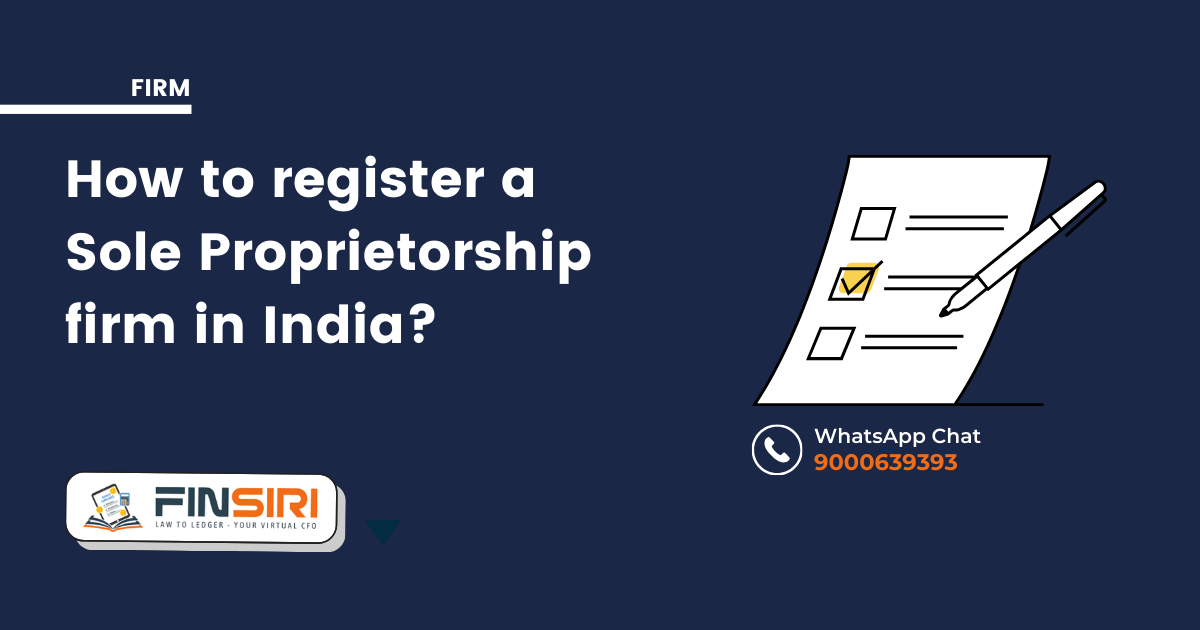Register a Sole Proprietorship Firm
Here’s a step-by-step detailed process:
Step 1: Choose a Business Name
(a) Select a unique name for your proprietorship.
(b) Ensure the name doesn’t violate any trademark or already registered entity.
(c) You can check trademark availability at the IP India website – https://ipindia.gov.in
Step 2: Get PAN Card (Mandatory)
If you don’t already have a PAN Card, apply for one as it is mandatory for business registration, tax filing, and opening a bank account.
Step 3: Open a Current Bank Account
(a) A current account in the name of the business is required.
(b) Banks will usually ask for at least one governmentissued registration/license as proof (like GST registration, Shop & Establishment license, or MSME certificate).
Step 4: Register under Relevant Business Laws
A sole proprietorship doesn’t have a single central registration process. Instead, you need to register under specific laws depending on your business activity:
(a) GST Registration (if applicable)
(i) Mandatory if annual turnover exceeds ₹40 lakh (₹20 lakh for service providers).
(ii) Also compulsory if you sell online (Amazon, Flipkart, etc.) or deal in interstate supply.
(iii) Apply online at GST Portal: https://www.gst.gov.in.
(b) MSME (Udyam Registration)
(i) Optional but highly recommended for availing government benefits, subsidies, and loans.
Free online registration at Udyam Registration Portal : https://udyamregistration.gov.in.
(c) Shop and Establishment License
(i) Mandatory in many states if you are opening a shop, office, or commercial establishment.
(ii) Issued by the local Municipal Corporation or Labour Department.
(d) Professional Tax Registration
(i) Required in some states (like Maharashtra, Karnataka, West Bengal) where Professional Tax applies.
(ii) Register with the respective State Tax Department.
(e) Other Registrations (if applicable)
(i) Import Export Code (IEC): Required if you are dealing in import/export of goods or services.
(ii) FSSAI License: Required if you are in the food business.
(iii) Trade License: Required by some local municipal authorities.
Step 5: Apply for BusinessSpecific Registrations (If Needed)
Depending on your industry, you may require:
(a) Drug License (for pharmaceuticals)
(b) Food License (FSSAI) (for food business)
(c) Trademark Registration (for brand protection)
Step 6: Maintain Compliance
Once registered, you must:
(a) File Income Tax Returns (ITR3 or ITR4) for your personal income including business profits.
(b) File GST Returns (if registered under GST).
(c) Pay Professional Tax (if applicable).
(d) Renew licenses (Shop Act, Trade License, etc.) as required by state laws.
Documents Required
1. Aadhaar Card of proprietor
2. PAN Card of proprietor
3. Address proof of proprietor (utility bill, driving license, etc.)
4. Business place proof (electricity bill, rent agreement, NOC from landlord, etc.)
5. Passportsize photographs
6. Bank account details
Summary:
To register a Sole Proprietorship in India, you don’t need incorporation like a company. Instead, you get various business registrations (GST, MSME, Shop Act, etc.), open a current account, and then start operations.



